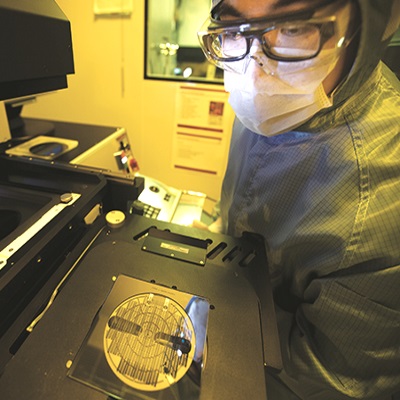23 October 2019
 South Australian Node Director of the Australian National Fabrication Facility (ANFF) and Foundation Fellow at the University of South Australia’s Future Industries Institute, Associate Professor Craig Priest is set to play an important role in keeping astronauts safe, as part of a new partnership with the National Aeronautics and Space Administration (NASA).
South Australian Node Director of the Australian National Fabrication Facility (ANFF) and Foundation Fellow at the University of South Australia’s Future Industries Institute, Associate Professor Craig Priest is set to play an important role in keeping astronauts safe, as part of a new partnership with the National Aeronautics and Space Administration (NASA).
The research he leads into the development of microfluidic sensor platforms (laboratories miniaturised on to a microchip) designed to monitor human health factors, will be an initial focus of the international partnership between NASA and the ANFF.
Assoc Prof Priest says the partnership will harness some of the exciting research in nanotechnology and microfluidics being undertaken at UniSA’s Mawson Lakes campus in a world class research environment supported by the ANFF.
“When you are working and travelling in space there is no doctor on board or regular health testing facilities and we know astronauts are operating in a challenging environment,” Assoc prof Priest says.
“We are aiming to work with NASA to develop non-invasive health self-assessment, and possibly wearable, tools that will be able to analyse things like sweat and saliva and track health effects in real time.
“The research supports ambitions for further and longer journeys into space and will help astronauts to monitor and mitigate the physiological effects of longer exposure to space environments.”
Director of UniSA’s Future Industries Institute, Professor Emily Hilder says the partnership with NASA is a strong indicator of the quality and relevance of the research being undertaken here in South Australia.
“This is a hugely exciting project and testament to the world class talent we have at UniSA,” Prof Hilder says.
“It also shows that UniSA researchers are playing an important role in some of the many applications supporting the international space industry.”
About ANFF
Established under the National Collaborative Research Infrastructure Strategy (NCRIS), the Australian National Fabrication Facility (ANFF) provides academia and industry with access to more than 500 state-of-the-art micro/nanofabrication facilities spread across 21 Australian locations. For more than a decade, ANFF has been enabling research through a mixture of training, expert support and direct access. The capability provided by ANFF enables users to process hard materials (metals, composites and ceramics) and soft materials (polymers and polymer-biological moieties) and transform these into structures that have application in sensors, medical devices, nanophotonics and nanoelectronics.
UniSA media contact: Michèle Nardelli phone: +61 418 823 673 or +61 8 8302 0966 email: michele.nardelli@unisa.edu.au




